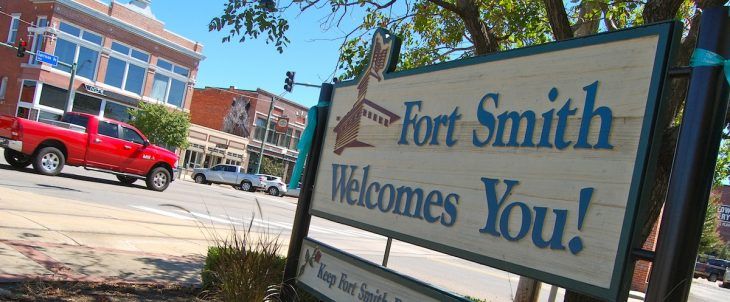Next Step Dayroom, Fort Smith Board discuss possible relocation
by June 27, 2018 5:07 pm 846 views

Next Step Dayroom estimates it will need $400,000 to build or renovate a new location to relocate from its 6th Street facility in downtown Fort Smith. The 501(c)(3), which provides services and transitional housing to the area’s homeless population, also would need to be able to preserve its current budget of approximately $1,000 per month in operating expenses at a new location.
Next Step Executive Director Kim Wohlford revealed as much to the Fort Smith Board of Directors in a sometimes tense exchange at a Tuesday (June 26) study session.
Board members like Ward 1 Director Keith Lau and At-Large Position 6 Director Kevin Settle struggled with the pushback they felt Next Step had given over keeping the current location, which is in a corridor the city hopes to develop as an entertainment district.
Lau particularly questioned the nonprofit’s unwillingness to move in or move closer to the Riverview Hope Campus to consolidate homeless services. Wohlford explained “We’re basically competition to each other. They are their own separate nonprofit, so if we were to move to the Hope Campus and we were part of it, people would say, ‘Well I’ve given to Hope Campus,’ and Hope Campus would get all that money. They won’t get any money designated for Next Step.”
Wohlford also said Next Step’s mission differs from the Hope Campus in that the latter “was built as a low-demand shelter, and that’s not what we do. We’re not a night shelter.”
“Hope Campus was built, phase-one, as a low-demand shelter where anyone that was supposed to be able to come, whether they were drunk or high or off the streets — it was a safe place where they could go spend the night and lay on the floor on a mat, and they have 100 spaces to do that,” Wohlford said. Furthermore, “We like where we are because we’re near the people and the services — the State Office building downtown, Community Rescue Mission and Salvation Army shelters are right there next to us, Workforce Services, the Drug Court, the parole officers — all of the services our clients deal with are right within walking distance.”
Other problems with Hope Campus cited by Next Step included the size of the facility.
“It’s too big,” Wohlford said, adding utilities at the facility are “at least $5,000 per month.” Next Step also believes Hope Campus “is a duplication of our services, and it would be confusing to the public.”
Settle seized on this reason, noting the Salvation Army and Community Rescue Mission duplicate services in offering night shelters.
“So to say one nonprofit has duplication of services and that’s the reason you shouldn’t do something is, in my mind, the wrong direction to go,” Settle said. “But there’s another piece of the puzzle here. You have (homeless) people walking through neighborhoods, people living in those neighborhoods. Our historic district is there, and (residents) are just as upset about people walking through their yards and trashing their stuff as anything else.”
Settle said it was time to think of “a long-term goal, and isn’t that helping homeless people regardless of who it is? I think that’s got lost somewhere in all this discussion. ‘I do this, we do this.’ Seems like we’re all just handling our own kingdom or building our own empire instead of working together to figure this out. We’re trying to come up with a solution for a long-term goal, so the neighborhoods don’t have people walking through them, we’ve got an entertainment district, and the city’s a vibrant, growing area.”
Next Step Dayroom began in 2002 and has received Community Development Block Grant (CDBG) federal funding through the city since 2005 for the purposes of supporting a variety of homeless services. According to data from Next Step, the organization has assisted more than 10,000 separate homeless individuals since 2008. In 2017, the organization provided over 102,000 homeless services, including but not limited to hot meals, job referrals, GED and computer skills training and testing, and housing assistance.
It also operates seven transitional housing sites throughout the city, including the Esther House for women and female veterans, Buddy Smith Home for homeless male veterans, and four locations that serve homeless families. Next Step’s transitional housing program has provided temporary housing for 211 men, women, and children in the last two years.
